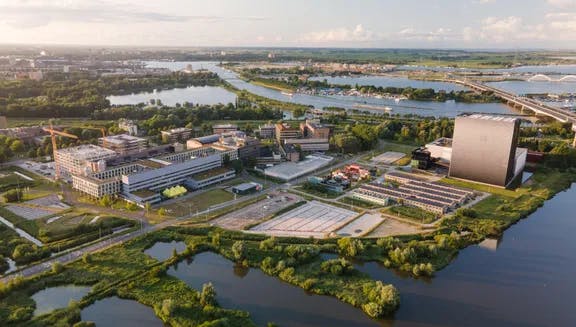
Amsterdam in international rankings
13 January 2025

Amsterdam’s life sciences and health ecosystem is thriving, and within this are startups and scale-ups that are really pushing the envelope on new technologies. One of the most famous of them is Aidence. The MedTech frontrunner has developed medical imaging AI applications to improve the early detection of lung cancer. SkinVision is an app that helps with the detection of melanoma and can be used to have moles analysed and tracked over time. Similarly, Skinive offers AI-assisted skincare and medical screening, which can recognise skin diseases and cancer risks. Medvice, meanwhile, provides a virtual medical assistant via an app.
Aidence
The energy transition is one of the biggest challenges facing our society on the way to make our lifestyles more sustainable. Ensuring access to affordable and reliable energy from renewables is crucial, and AI can help make this task much easier. Take AMMP, for example: the Amsterdam-based startup provides a platform for energy service companies in emerging markets, allowing them to track performance and supply issues and this simplifying access to renewable or hybrid energy systems. Dexter Energy, which offers AI-based energy-use forecasts to reduce imbalance on the electricity grid, and Sympower, which aims to facilitate green energy systems through advanced flexibility software, are also at the ready to support the energy transition.
There is huge potential in agriculture for processes to become less wasteful of water and destructive to the soil. Sensoterra, based at the Amsterdam Science Park, make robust and affordable wireless soil moisture sensors, helping farmers to achieve higher yields and use less water. Because having data about natural resources is key to protecting them, Overstory provides systems to monitor forests, trees and natural ecosystems so we can mitigate climate change and protect biodiversity. And the Land Life Company is on a mission to plant enough trees to stop, or even reverse, deforestation.
There are many ways to make fashion and e-commerce more sustainable. Project Cece’s platform helps consumers make more ethical choices by providing information about products’ provenance and production processes, using filters such as ‘fair trade’, ‘local’, ‘environmentally friendly’ and ‘vegan’. And Lalaland makes e-commerce more sustainable and inclusive by developing AI-driven virtual models, letting consumers choose those that reflect their own looks. By vetting the clothing before purchasing, there is a lower chance of having to Mari Kondo outfits into the bin.
Project Cece
On a way to a fairer, more inclusive society, education and work are arguably among the most essential elements. Skilllab aims to make outdated recruitment practices obsolete by providing AI-driven tech that helps people access and navigate the labour market. Leer Uniek’s platform offers new ways for teachers and schools to analyse developments and performance of their pupils, enabling them to better adapt teaching processes to their needs while offering more objective and thus fairer data. And Blue Feniks is a system where employees can report unwanted behaviour and dangerous situations safely and easily, making work environments safer and fairer for all.
These are just a few of the many ways that AI can be utilised to make our society fairer, less wasteful, healthier and greener. With its thriving tech and startup ecosystem and a number of research institutions in the field, Amsterdam offers the perfect base for those wanting to make it happen. The Innovation Center for AI (ICAI) is a national initiative focused on joint technology development between academia, industry and government. The city’s two universities offer a joint master's programme in AI, and the Amsterdam School of Data Science, a collaboration between four research and applied sciences universities, offers more than 250 data science-driven programmes. The Expertise Centre Applied Artificial Intelligence (ECAAI) of the Amsterdam University of Applied Sciences was launched in 2020 and now brings together all the university’s AI research and education, driving the responsible and inclusive development of AI applications. Academic labs that work closely with the industry include the AI Startup Lab, the Qualcomm-QUVA Lab and the UvA-Bosch DELTA Lab.
Amsterdam’s reputation as an AI hub is grounded in its capability for innovation and its entrepreneurial spirit, but, perhaps most importantly, its tradition of working together across sectors in a strong, interconnected ecosystem. Continuous collaborations between business, researchers and public life are pushing AI into all areas of business and society, offering a real chance to deploy new tech to solve old problems and address current challenges.